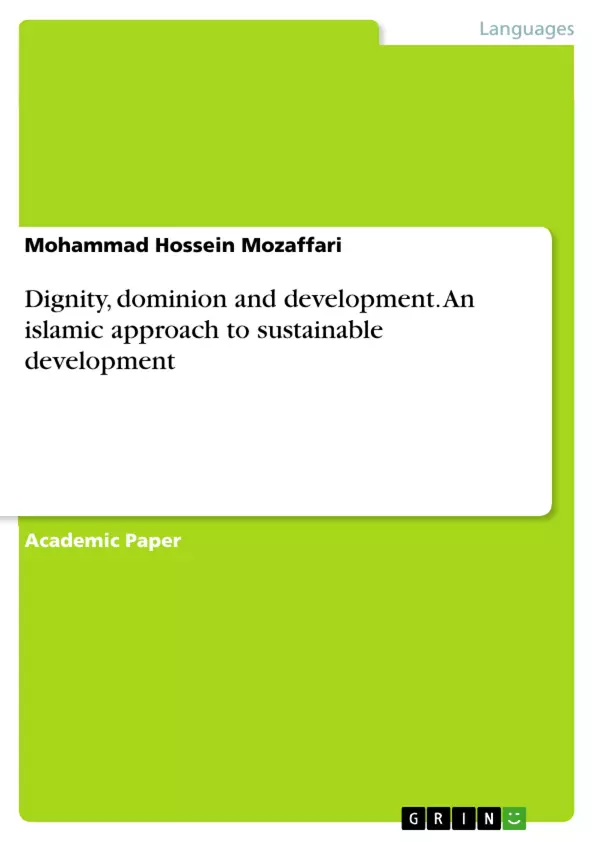This paper seeks to examine the concept of inherent dignity of man in relation to the traditional paradigm of human dominion over the creation and its impact on sustainable development.
The first part of the paper deals with the concept of inherent dignity in international and regional human rights instruments. In the second part of the paper, I shall discuss the concept of dignifying all other creature as an alternative paradigm to protect the environment. And the third part shall focus on the concept of human dignity and human dominion over all other creation in the light of the Holy Quran and other sources of Islamic jurisprudence. Finally, the paper concludes that human dignity is a foundational notion that can theoretically contribute to the justification of human rights and it is not in contradiction with other religious instructions that define Man's relationship with God's creation. However, ecotheology is only one factor among many other elements that should contribute to the study of the contemporary ecological crisis.
Inhaltsverzeichnis (Table of Contents)
- Introduction
- Rejectionists' Claim
- Exclusivists' Response
- Human Dignity and Dominion in Islam
- Conclusion
Zielsetzung und Themenschwerpunkte (Objectives and Key Themes)
This paper aims to explore the concept of inherent human dignity in relation to the traditional paradigm of human dominion over creation and its impact on sustainable development. It examines the concept of human dignity in international and regional human rights instruments, explores alternative paradigms for protecting the environment, and analyzes the Islamic perspective on human dignity and dominion.
- Human dignity as the foundation of human rights
- The anthropocentric paradigm and its impact on the environment
- Alternative perspectives on human dignity and the environment
- The Islamic concept of human dignity and dominion over creation
- The role of ecotheology in addressing the ecological crisis
Zusammenfassung der Kapitel (Chapter Summaries)
- Introduction: This chapter introduces the concept of inherent human dignity as the foundation of human rights, highlighting its prominence in international and regional instruments. It also acknowledges the ongoing debate regarding the theoretical justification of human dignity and its connection to the anthropocentric paradigm.
- Rejectionists' Claim: This chapter delves into the arguments of scholars who challenge the notion of human dignity, claiming it to be a vaguely defined concept rooted in Judeo-Christian tradition. They argue that the anthropocentric paradigm derived from this concept contributes to ecological crisis.
- Exclusivists' Response: This chapter explores the responses of ecologists who advocate for extending dignity to the rest of creation to address the environmental crisis. They challenge the anthropocentric paradigm and propose alternative approaches to protecting nature.
- Human Dignity and Dominion in Islam: This chapter examines the Islamic perspective on human dignity and dominion over creation, drawing upon the Holy Quran and other sources of Islamic jurisprudence. It explores the relationship between human dignity and the Islamic understanding of man's role in managing God's creation.
Schlüsselwörter (Keywords)
The primary keywords and focus topics of this work include human dignity, sustainable development, ecology, ecotheology, anthropocentric paradigm, and Islamic jurisprudence. The paper explores the theoretical foundations of human rights, the ethical implications of the anthropocentric paradigm, and the potential for ecotheology to contribute to solutions for the ecological crisis.
Frequently Asked Questions
What is the Islamic perspective on human dignity?
In Islam, human dignity is an inherent concept rooted in the Holy Quran, defining man's role as a steward of God's creation with specific rights and responsibilities.
How does the concept of human dominion affect the environment?
The traditional anthropocentric paradigm of dominion is often criticized for contributing to the ecological crisis, though religious interpretations often emphasize responsible management rather than exploitation.
What is ecotheology?
Ecotheology is a form of constructive theology that focuses on the interrelationships between religion and nature, particularly in the light of environmental concerns.
Is human dignity in contradiction with environmental protection?
No, the paper concludes that human dignity is a foundational notion for human rights and is not inherently in contradiction with religious instructions to protect God's creation.
What is sustainable development in an Islamic context?
It involves balancing human needs and dignity with the ethical obligation to preserve the environment as a trust (Amanah) from God.
- Citar trabajo
- Mohammad Hossein Mozaffari (Autor), 2014, Dignity, dominion and development. An islamic approach to sustainable development, Múnich, GRIN Verlag, https://www.grin.com/document/1021473



